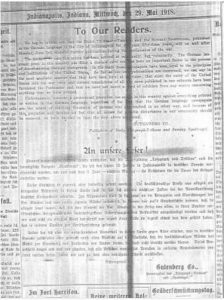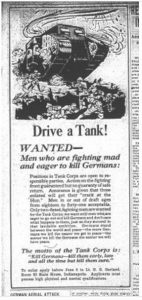The Disappearance of the German Language Press In Indianapolis And Throughout the United States During 1917 and 1918
On May 3, 1918 the Täglicher Telegraph und Tribüne printed on page 1 an announcement citing an opinion of the U.S. Attorney General that the United States Government will not lend its aid to the “drive” for the suppression of newspapers printed in German, PROVIDED THAT THEY DO NOT ENGAGE IN UNLAWFUL PROPAGAGNDA”. On May 8 Täglicher Telegraph und Tribüne printed on page 1 an announcement quoting President Wilson, “I would just as leave Americanize a language as Americanize an individual. You should not regard the language in which you print your periodicals as a foreign language when printed in America for the conveyance of American thinking. Then we will have taken another step toward that combination of elements which in the long run is going to make America more various in its natural gifts, more variegated in its genius than any other country in the world.” On May 17, 1918 the Täglicher Telegraph und Tribüne printed on page 1 an announcement where Mr. George Creel (of the Committee for Public Information) opined that “…the loyal American press printed in the German language fulfills an important mission…the German papers had a right to continue so long as Congress had not abrogated that right…” Mr. Creel also opined that “…he did not favor teaching German in the primary grades of schools, but that he was not opposed to having it taught in the higher grades, as there always were some person who desired to read Goethe and Schiller in the original.” On May 23, 1918 the Täglicher Telegraph und Tribüne printed on page 1 an announcement related how Champ Clark, the Speaker of the House of Representatives, said that “…the readers of the American papers printed in the German Language need have no fear of Congress ever passing a law to suppress these papers, providing they observe the existing laws…He called the German language newspapers loyal and said that the Government itself was most benefited by them and that the Government fully appreciated the services rendered by them.”
On May 29, however, the Täglicher Telegraph und Tribüne printed on page 1 an announcement that it and the Spottvogel would cease publication on Monday June 3, 1917 after fifty three years of publication. The announcement received coverage in the English language press with a front page article in the Indianapolis Star. The Indianapolis Star article quotes Otto E. Tamm, the advertising manager of the Täglicher Telegraph und Tribüne and the Spottvogel, “We are neutral before the entrance of the United States and we have been loyal since.” In the announcement printed on the front page of the Täglicher Telegraph und Tribüne it was stated that, “Unfortunately, however, a pronounced prejudice has arisen in this country against everything printed or written in the German language, regardless of the fact that the German language newspapers are the means of reaching thousands of persons who are reached in no other way, and because of this prejudice and because we feel that all causes for possible disturbance in our community should be removed, we have decided to take the step suggested.”

One wonders about the wording “possible disturbance in our community”, were vigilante groups threatening to become active in Indianapolis? In any event, given the anti-German propaganda that the American public was completely marinated in by this time, it would seem a hopeless task for any German language paper published in the United States to stay in business. Perhaps an advertisement that appeared in the May 31, 1918 issue of the Indianapolis Star best captures the feeling of the times. The advertisement is encouraging young men who possess high physical and mental qualifications to join the army tank corps whose motto is “Kill Germans – kill them early, late and all the time but kill them sure.”

